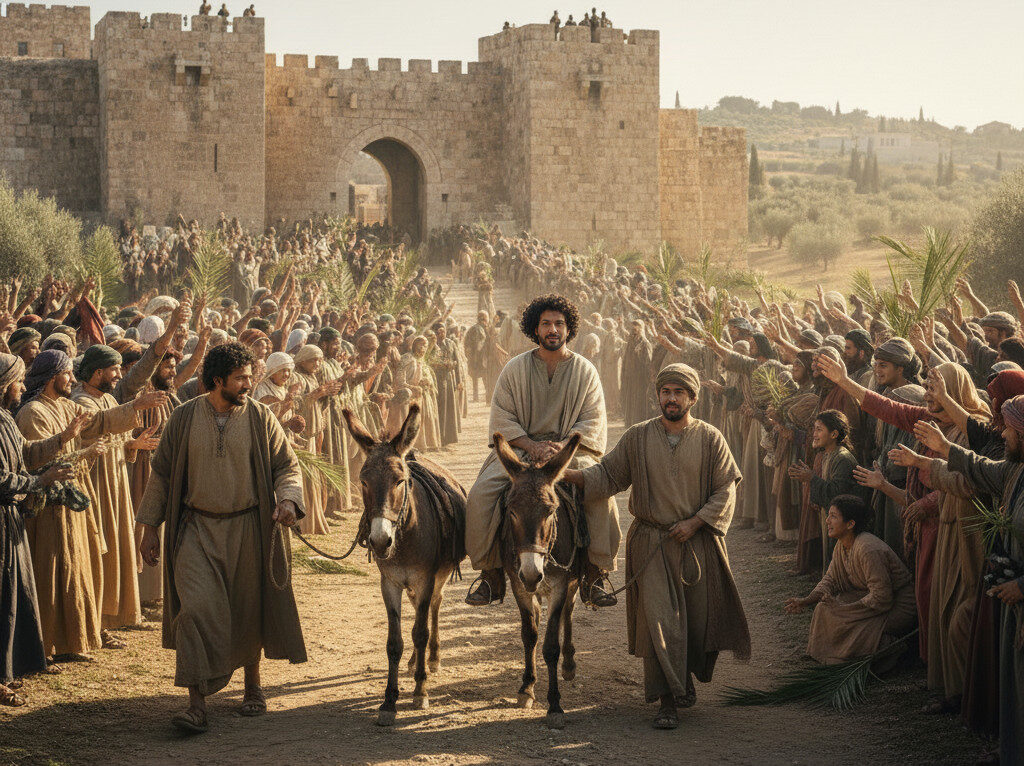Ezekiel 37:15-28 and Elements of God’s Future Promises to Israel
By Dr. Keith Kobelia / January 30, 2026
The Prophet Ezekiel was called to an unusual but important ministry to the captives of Judah in Babylon. Despite his unusual methods (e.g., symbolic acts) and extraordinary visions (e.g., Ezek...
Read More
Why the Promises to Israel Matter Today
By Dr. Daniel Brown / November 15, 2025
Fulfilled Messianic Prophecies from the Book of Zechariah
By Dr. Keith Kobelia / September 15, 2025
Among the most intriguing prophetic sections of the Bible are the prophecies of Zechariah which are contained in the book that bears his name. Zechariah is teeming with Messianic prophecies,...
Read More
The Virgin in Isaiah 7:14
By Dr. Timothy A. Little / July 1, 2025
INTRODUCTION According to the Gospel of Matthew, the virgin Mary was found to be with child of the Holy Spirit. Jesus the Messiah was miraculously conceived, and, several months later,...
Read More
1 Reply
{"slides_column":1,"slides_scroll":1,"dots":"true","arrows":"true","autoplay":"true","autoplay_interval":"5000","speed":"1200","lazyload":""}
What I Like to See in a Bible Version for Study Purposes
Posted on by Dr. Myron J. Houghton
Introduction
In this brief article I am not giving a detailed evaluation of Bible translations. Rather, I am sketching in broad strokes three issues that are important when choosing a version of the Bible for study purposes.
A Literal Translation
A literal translation is based upon the idea that the purpose of a translation is to let the reader know what the Bible says rather than what the Bible means. Yet many modern readers use meaning-for-meaning versions and paraphrases because they think the meaning of the Bible has been made clear.
The Da Vinci Code and Early Christian History, Part 2
Posted on by Dr. Paul Hartog
Other Historical Issues
Teabing argues that Christians and pagans were warring in the early fourth century, “and the conflict grew to such proportions that it had threatened to rend Rome in two.” FACT: Christianity did not have enough political or military clout to rival the pagan masses in the early fourth century. Christianity actually began the century as an oppressed minority suffering under the Great Persecution of A.D. 303–313.
Langdon asserts that early Christianity “honored the Jewish Sabbath of Saturday, but Constantine shifted it to coincide with the pagan’s veneration day of the sun.”
The Da Vinci Code and Early Christian History, Part 1
Posted on by Dr. Paul Hartog
The Da Vinci Code, authored by Dan Brown, has quickly become an international bestseller and is now in theatrical release.1 Because of its depiction of Jesus Christ and Christianity, this fictional page-turner has caused vociferous reactions far outside the literary world. Page one of the work, entitled “FACT,” asserts that “All descriptions of artwork, architecture, documents, and secret rituals in this novel are accurate.” The book actually includes numerous historical inaccuracies, however. For the sake of time and convenience, this article will simply highlight those factual errors surrounding the book’s portrayal of early Christianity.2 These historical blunders particularly concern the fields of canonicity and Christology and are especially concentrated in the discussions on pages 230–259.
The Value of Bible Software for Ministry, Part 2
Posted on by Dr. Timothy A. Little and Dr. Douglas Brown
Choosing the Right Bible Software: A Closer Look at BibleWorks and Accordance
There are numerous Bible software programs available to students of God’s Word. We will raise three basic factors to consider in choosing the right program for your circumstances. First, consider the cost. For the most part, you get what you pay for, because most of the databases for biblical research (e.g., various Bible translations, lexicons, and dictionaries) are available to any software maker. While some of the databases are public domain and are therefore free, other databases cost money.
The Value of Bible Software for Ministry, Part 1
Posted on by Dr. Douglas Brown and Dr. Timothy A. Little
Never before has there been a more exciting time to study the Word of God. Resources that at one time were available only to a few privileged people are now available to anyone with a computer. Over the last two decades, Bible software has made incredible leaps in providing students of the Word of God with powerful tools for exegesis. Both of us have used Bible software programs extensively in our education, teaching, and church ministries. Barely a day goes by when we are not using our respective research programs for classes, sermon and lesson preparation, scholarly research, or simply for devotions.
When Does (the Sanctity of) Life Begin?
Posted on by Dr. David Boylan
When life begins is a question of current interest in theology, science and the media. The issue is clouded by emotion and personal beliefs. Some contend that life begins at conception. Some believe life begins at birth. Others say the beginning of life occurs in various stages of individual development. The “beginning of life” is germane to stem cell research, cloning, abortion rights, and euthanasia.
As with many controversial issues, a clear understanding is seldom achieved. Definitions are, many times, drafted to suit a particular personal belief or political position.
The Meaning of 1 John 3:9
Posted on by Dr. Myron J. Houghton
Four Views That Appeal To This Verse
1. The works-righteousness view
This view teaches that one earns or keeps salvation by good works, and thus that the person who chooses to sin has forfeited any right to heaven. This view contradicts the Bible’s clear teaching on salvation as God’s gift through faith (Ephesians 2:8–9), purchased for us not by our works but by the sacrifice of Christ upon the cross (Romans 3:24–25, 2 Corinthians 5:21, 1 Peter 2:24).
2. The instantaneous sanctification/Wesleyan view
This view states that it is possible for a believer to have an experience following conversion in which the principle or root of sin is removed and replaced by love for God.
Economic Wisdom as an Analogy to Prudence of Separation, Part 2
Posted on by Dr. Paul Hartog
We have previously demonstrated that economic prudence involves the judicious allocation of limited resources. Economic wisdom also reminds us that personal freedoms must be balanced by public necessities and a shared communal well-being. Samuel Gregg argues that “it is irresponsible for people studying public policy from a Christian perspective to ignore not only the self-evident fact of scarcity but also the likely economic consequences of different choices.”1 Therefore, economic ethics “involves discerning the object of an act and the intention underlying the act, as well as considering the side effects of the act and the circumstances surrounding it.”2
Economic Wisdom as an Analogy to Prudence of Separation, Part 1
Posted on by Dr. Paul Hartog
Sound economic theory assumes the fundamental and undeniable reality of “limited resources.” Lionel Robbins, former Chair in Political Economy at the London School of Economics, defined economics as “the science which studies human behavior as a relationship between ends and scarce means which have alternative uses.”1 Robbins wrote, “But when time and the means for achieving ends are limited and capable of alternative application, and the ends are capable of being distinguished in order of importance, then behavior necessarily assumes the form of choice.
Real Religion, Part 2
Posted on by Dr. Ernie Schmidt
Care for widows should be viewed from two perspectives immediate and long term. First, the death of the husband must be addressed. The wife’s world is devastated. Her lifelong companion and provider is gone. Words do not do justice to the instant, entire, irreversible change that occurs at the moment a woman loses her mate. Special consideration must be given to this time and the immediate days and weeks that follow.
Immediate Ministry
We must realize that a woman instantaneously experiences a transition from dependence to an independence for which she is not prepared.



